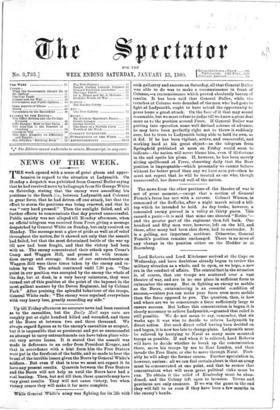Lord RoLerts and Lord Kitchener arrived at the Cape on
Wednesday, and have doubtless already begun to review the military situation as a whole, and to open, as we hope, a new era in the conduct of affairs. The central fact in the situation is, of course, that our troops are scattered over a vast theatre of war, and are in no one place in sufficient force to outnumber the enemy. But in fighting an enemy so mobile as the Boers, outnumbering is an essential condition of success,—unless you can make your force even more mobile than the force opposed to you. The question, then, is how and where are we to concentrate a force sufficiently large to ensure success. But before this concentration is begun it is clearly necessary to relieve Ladysmith,—granted that relief is still possible. We do not mean to say, remember, that six weeks ago it was wise to decide to relieve Ladysmith by direct action. But such direct relief having been decided on and begun, it is now too late to change plans. Ladysmith must be relieved by hurrying to Natal as many more mounted troops as possible. If and when it is relieved, Lord Roberts will have to decide whether to break up the concentration there, move his troops by sea to East London, and then invade the Free State, or else to move through Natal. Prob- ably he will adopt the former course. Further speculation is, however, useless ; all we can feel certain about is that an army must be concentrated at one point, and that to secure that concentration what will seem great political risks must be run. To obtain it the relief of Kimberley must be aban- doned, and the Colony left open to invasion. Towns and provinces are only counters. If we win the game in the end they will fall to us even if they have been a few months in the enemy's hands.






































